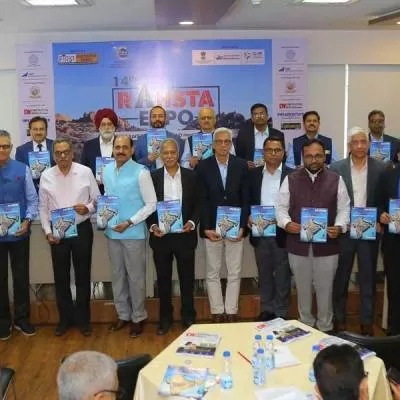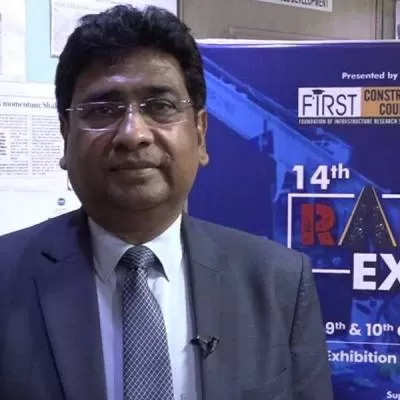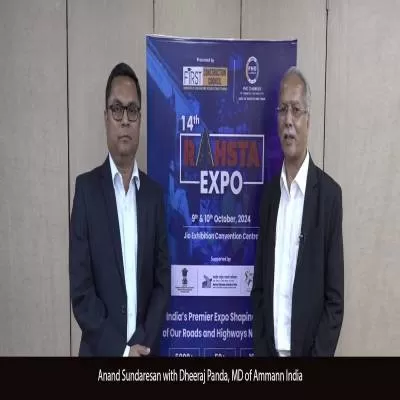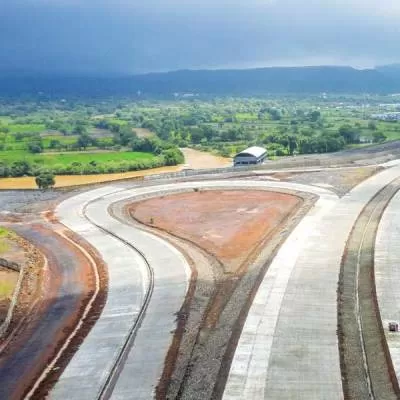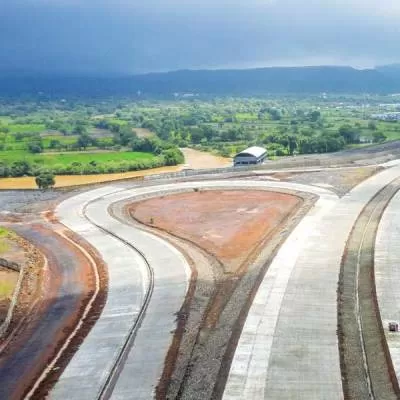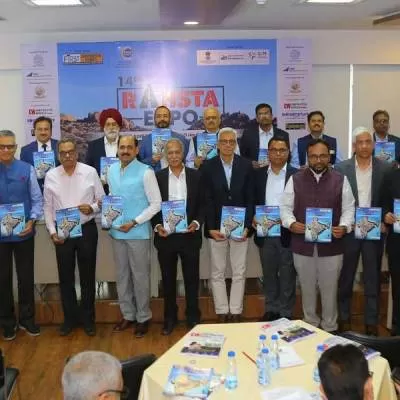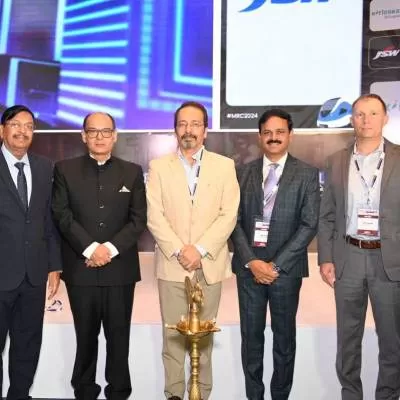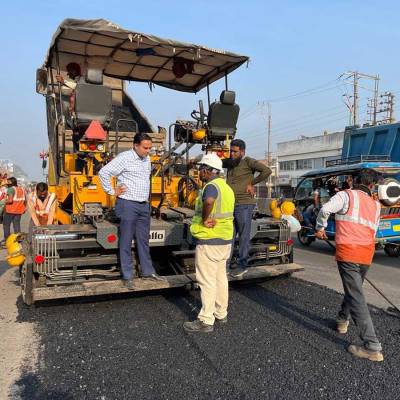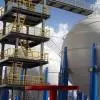- Home
- Infrastructure Transport
- ROADS & HIGHWAYS
- High road to productivity
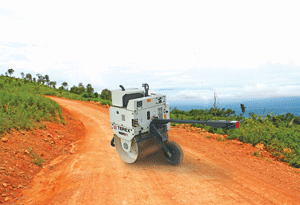
High road to productivity
The Indian road construction equipment sector has grown handsomely in the last decade or so. Greater focus on developing world-class road infrastructure across the country has spurred demand for equipment like crawler excavators, backhoe loaders, wheel loaders, tandem rollers, compactors, motor graders and cold planers.
Speed breaker
Citing figures released by the Indian Construction Equipment Manufacturers' Association, Vijay Sharma, Executive Director, Terex Equipment Pvt Ltd, points out that the road construction equipment industry has grown at a CAGR of 18-20 per cent over the past decade. But with the Indian economy performing below par, this growth has considerably slowed. "Policy paralysis has heavily hit the growth momentum," he says. "Decision making and the process of awarding contracts for building new roads has slowed. More infrastructure houses are finding it difficult to make both ends meet as the pace of fund flows has also slowed."
As a result, double-digit growth has been reduced to single-digit expansion. "Demand for road construction equipment is conservative owing to overall delays in project execution," says Amit Gossain, Executive Vice-President-Marketing, Business Development & Corporate Affairs, JCB India Pvt Ltd. "Even after being approved by the Central Government and achieving financial closure, many projects have not progressed."
"As of last year, the market uptake for different road construction equipment was 2,500 machines," says AM Muralidharan, President, Volvo Construction Equipment India. "Key products in this segment are pavers, soil compactors and motor graders. Demand is expected to grow by 5-10 per cent in coming years."
Growth prospects
In spite of road project execution challenges and financing stresses, Muralidharan is optimistic about the future prospects of the road industry and, hence, the opportunities for road construction equipment. "Planned highway expansion of 36,000 km augurs well for the road construction industry, especially the proposal for at least 47 per cent of this investment to come from the private sector," he explains. "It's a huge sum, about Rs 390,000 crore. Another positive is the aim of the Ministry of Road Transport and Highways to achieve the target of 20 km of highway construction per day during the first half of 2014-15. Recently, the Prime Minister reviewed the performance of the transport sector and has promised to expedite the process of allotting road projects as per the original target for FY12-13."
"We see positive medium to long-term growth prospects for vibratory compactors and for loader backhoes, two segments in which we lead the market," says Anil Bhatia, Director - Sales and Marketing, Case New Holland Construction Equipment (India) Pvt Ltd. "Demand for these products is strongly affected by land acquisition, interest rates and the pace of infrastructure project approvals. Government investments in infrastructure are sure to pick up to meet the ambitious growth target of the nation."
While Sharma doesn't foresee any major revamp in the coming year or two, he is eagerly awaiting a turnaround.
According to Gossain, demand for road equipment will increase once the fast-track implementation of projects such as the Delhi Mumbai Industrial Corridor and Dedicated Freight Corridor begins. He advocates active monitoring to ensure proper and smooth implementation.
"Overall, the medium to long-term growth prospects are bright because India desperately needs more world-class road infrastructure," he adds. "Projects like the Pradhan Mantri Gram Sadak Yojana also bode well for the industry; 3,000 km of road projects have recently been announced."
Innovation ahoy
That leading vendors are positive about their future prospects is evident from their focus on tweaking their product range to meet evolving market demand. Volvo believes in constant innovation and has a slew of products suitable for the Indian market in the pipeline for release. "These will be premium products," clarifies Muralidharan, because Volvo CE's experience is that customers are just waiting to be shown the long-term value in the ownership and performance of machines. "Then, customers look beyond the initial cost and evaluate total lifecycle cost," he adds. "They become willing to invest in a machine that provides them with long-term benefits."
Globally, Case is known for offering a full line of premium quality construction equipment. It is determined to build the same reputation in India. To this end, it has a clear focus on expanding its product offerings locally. Skid steer loaders were launched in July 2012. The water-cooled Case 752 tandem vibratory compactor was launched in January 2013. And B series motor graders and F series wheel loaders were launched at Bauma Mumbai in February 2013.
In order to meet local demand, Case has also adapted products to suit Indian conditions. According to Bhatia, "Our loader backhoes and compactors are designed and manufactured to meet the needs of Indian customers, without compromising on global quality standards. Continuous improvements are made in existing product models. We firmly believe that technologically advanced products will see more takers."
Winner's choice
No doubt, far-sighted construction companies have moved beyond cost economisation and asking vendors for only those equipment with technical specifications that are mandated by NHAI guidelines; these cover hot mix plants, concrete batching plants, pavers with grade and slope sensors, vibratory soil compactors, tandem rollers, etc. Today, technology factors majorly in their equipment buying decisions.
As Pradeep Kathuria, Head & CEO, Essar Equipment Bank, Essar Projects, shares, "We look for equipment on a par with global technology standards as available in developed countries. In the road construction equipment segment especially, the latest models are more environment-friendly (Tier-III, Tier-IV), productive, versatile, cost-effective and safer to use. For example, cold milling machines allow the by-product from milling existing road surface to be reused as raw materials, which helps to save cost on ever increasing input costs. Latest asphalt pavers with 12-m screed can lay roads in one pass, thus proving to be huge time and cost savers. Older models of pavers need at least two passes to lay these types of roads. Automatic hot mix and batching plants can be easily configured between different modes to produce a variety of outputs."
Productivity aside, latest technologies favourably impact the quality of road construction. "Whereas earlier models of road rollers only used weight for compactions, the new range of vibratory soil compactors and tandem rollers offer far superior compaction quality," elucidates Kathuria. "Recent tandem rollers offer noise-free vibrations." Companies are as conscious about getting good after-sales service and strong support networks in India. "Spares and service support must be available off-the-shelf; this helps optimise equipment utilisation," he adds.
In high-end technologies, companies especially look for user-friendly features that can help optimise the use of the equipment. As Sanjay Londhe, Director, Ashoka Buildcon Ltd, explains, "The key features we look for are high output efficiency, fuel efficiency, and latest technologies such as GPS. We also desire that the manufacturer should offer optimum after-sales services. For example, he should be open to annual maintenance contracts. We give preference to manufacturers who commit to maximum limits for maintenance and running costs on a per-hour basis. In such cases, if the cost goes above the committed limit, the additional cost is borne by the manufacturer. We look forward to machines that are automated and minimise human interference. This reduces human errors to a great extent. Features such as a SCADA-based system for hot mix plant, use of compactometers for compactors and tracking devices of carriers are some technologies we look for while purchasing equipment. Such aids help bring in operational efficiency and recoup the higher cost of the machine."
Equally important, Londhe points out the need to match capacities of different road equipment. "As the construction of roads is a step-by-step process involving materials (hot mix) that must be brought to site often from plants situated 20 km or more away, it is vital to match the per-hour consumption rate of the paver, the carrying capacity of hot mix carriers and the distance between the plant and site, and the output per hour of the hot mix plant," he says. At Ashoka Buildcon, emphasis is also placed on machine maintenance through innovative contracts that reward the vendor for consistent services. It appears that innovation and drive will take the road construction equipment industry ahead.
Case: Cementing good ties with suppliers
Product: Backhoe loaders, tandem rollers, vibratory rollers
Vendor: JCB India
User: D2S Infrastructures Pvt Ltd
Application: Construction of various bridge projects in the North-eastern states and Bhutan.
Reason for choice: "First, we bought backhoe loaders from JCB India," says SK Chellani, Vice Chairman, D2S Infrastructures Pvt Ltd. "We found the product to deliver great value for money and the after-sales services were prompt. One positive experience led to another. Nowadays, we also prioritise timely deliveries of new machines; this is critical when the equipment is needed to start new projects on time."
Case: Focus on productivity
Product: Case 752 tandem vibratory compactors
Vendor: Case New Holland Construction Equipment (India) Pvt Ltd
User: Ashwini Infra Developments Pvt Ltd
Application: Construction of runways at Mumbai airport and repairs and building of asphalt roads in Mumbai (BMC projects)
Reason for choice: According to Ravi Gouder, Director, Ashwini Infra Developments Pvt Ltd, "These machines boast of high compaction forces that help reduce the number of passes required and hence increase productivity, a prime objective. Another pro-productivity feature is their ergonomically designed cabin space that ensures operator comfort. They allow all-round visibility, which makes for safer and better operations. Also, the machines are low maintenance and reliable workhorses, which helps cut costs and thus meet one more important objective."
Case: Prioritising support and reliability
Product: Walk behind roller, a single-drum hydrostatic vibratory compactor
Vendor: Terex Equipment Pvt Ltd
User: PNC
Application: Multiple units of the walk behind roller are being used for small compaction jobs and asphalt, also for compaction in trenches and embankments.
Reason for choice: "They are compact in size but highly efficient at work, especially in narrow spaces," says Shailendra Chauhan, Manager - Mechanical, PNC. Additionally, Terex offers round-the-clock after-sales support, making it doubly useful for customers to own this product. Terex machines offer excellent reliability and performance.
Productivity guide: Choosing the right equipment
Using the right equipment suitably configured with relevant features can favourably impact productivity and lower costs. According to Shankar N Srivastava, Director, Engineer Pro Consultants, here's what you should be looking for in the major categories of road construction equipment:
Asphalt paver: Features that can help boost productivity are electronic paving management module, electronic control for screed operation, sliding type operator station, tamping and heated screeds, and hydraulically extendable/retractable self-locating screeds. For best outcomes, the paver should be equipped with equaliser bars/averaging beams to ensure that the required levels of the layers are achieved with minimum effort and manual intervention. Similarly smooth, jerk-free traction helps reduce the layer disturbance during the start of paving. Make sure the machine has an on-board generator for power supply towards heating and other requirements, so that this does not have to be separately provided for. Features such as foldable canopy and silencer add to the machine's versatility by facilitating paving in low head room areas like underpasses. Look for high wear-resistant conveyor links, bottom plate, augers, tamping plates and other screed components to bring down operational costs.
Motor graders: Productivity can be enhanced by using machines boasting of high horsepower with low machine weight ratio, high traction capability and easy-to-use grader blade arrangement with high reliability of grader angles. To lower maintenance costs, look for reliable synchronised rear wheel drives, sturdy structurals and reliable hydraulics. Laser-guided grader management such as Accugrade technology helps get the best outcomes.
Vibratory soil compactors/tandem rollers: The best results come from machines with high weight, allowing infinitely variable vibration frequency and amplitude within the operating range; also with hydrostatic drive units and on-board compaction measurement and software.
Pneumatic tyre rollers: Look for machines with high weight and high horsepower.
Earthmoving equipment: Brand plays a small role in selecting this equipment. Selection will depend on the actual road construction activity the company is involved in. As it is, very few companies own and operate earthmoving equipment. Most go in for rented equipment (which is easily available) or subcontract earthwork. This helps lower operational costs and the value of one's own assets deployed in a project.
To share your views on this article, write in at feedback@ASAPPmedia.com
Road developers are making definite gains from technology-loaded road construction equipment being introduced in India, discovers CHARU BAHRI. The Indian road construction equipment sector has grown handsomely in the last decade or so. Greater focus on developing world-class road infrastructure across the country has spurred demand for equipment like crawler excavators, backhoe loaders, wheel loaders, tandem rollers, compactors, motor graders and cold planers. Speed breaker Citing figures released by the Indian Construction Equipment Manufacturers' Association, Vijay Sharma, Executive Director, Terex Equipment Pvt Ltd, points out that the road construction equipment industry has grown at a CAGR of 18-20 per cent over the past decade. But with the Indian economy performing below par, this growth has considerably slowed. "Policy paralysis has heavily hit the growth momentum," he says. "Decision making and the process of awarding contracts for building new roads has slowed. More infrastructure houses are finding it difficult to make both ends meet as the pace of fund flows has also slowed." As a result, double-digit growth has been reduced to single-digit expansion. "Demand for road construction equipment is conservative owing to overall delays in project execution," says Amit Gossain, Executive Vice-President-Marketing, Business Development & Corporate Affairs, JCB India Pvt Ltd. "Even after being approved by the Central Government and achieving financial closure, many projects have not progressed." "As of last year, the market uptake for different road construction equipment was 2,500 machines," says AM Muralidharan, President, Volvo Construction Equipment India. "Key products in this segment are pavers, soil compactors and motor graders. Demand is expected to grow by 5-10 per cent in coming years." Growth prospects In spite of road project execution challenges and financing stresses, Muralidharan is optimistic about the future prospects of the road industry and, hence, the opportunities for road construction equipment. "Planned highway expansion of 36,000 km augurs well for the road construction industry, especially the proposal for at least 47 per cent of this investment to come from the private sector," he explains. "It's a huge sum, about Rs 390,000 crore. Another positive is the aim of the Ministry of Road Transport and Highways to achieve the target of 20 km of highway construction per day during the first half of 2014-15. Recently, the Prime Minister reviewed the performance of the transport sector and has promised to expedite the process of allotting road projects as per the original target for FY12-13." "We see positive medium to long-term growth prospects for vibratory compactors and for loader backhoes, two segments in which we lead the market," says Anil Bhatia, Director - Sales and Marketing, Case New Holland Construction Equipment (India) Pvt Ltd. "Demand for these products is strongly affected by land acquisition, interest rates and the pace of infrastructure project approvals. Government investments in infrastructure are sure to pick up to meet the ambitious growth target of the nation." While Sharma doesn't foresee any major revamp in the coming year or two, he is eagerly awaiting a turnaround. According to Gossain, demand for road equipment will increase once the fast-track implementation of projects such as the Delhi Mumbai Industrial Corridor and Dedicated Freight Corridor begins. He advocates active monitoring to ensure proper and smooth implementation. "Overall, the medium to long-term growth prospects are bright because India desperately needs more world-class road infrastructure," he adds. "Projects like the Pradhan Mantri Gram Sadak Yojana also bode well for the industry; 3,000 km of road projects have recently been announced." Innovation ahoy That leading vendors are positive about their future prospects is evident from their focus on tweaking their product range to meet evolving market demand. Volvo believes in constant innovation and has a slew of products suitable for the Indian market in the pipeline for release. "These will be premium products," clarifies Muralidharan, because Volvo CE's experience is that customers are just waiting to be shown the long-term value in the ownership and performance of machines. "Then, customers look beyond the initial cost and evaluate total lifecycle cost," he adds. "They become willing to invest in a machine that provides them with long-term benefits." Globally, Case is known for offering a full line of premium quality construction equipment. It is determined to build the same reputation in India. To this end, it has a clear focus on expanding its product offerings locally. Skid steer loaders were launched in July 2012. The water-cooled Case 752 tandem vibratory compactor was launched in January 2013. And B series motor graders and F series wheel loaders were launched at Bauma Mumbai in February 2013. In order to meet local demand, Case has also adapted products to suit Indian conditions. According to Bhatia, "Our loader backhoes and compactors are designed and manufactured to meet the needs of Indian customers, without compromising on global quality standards. Continuous improvements are made in existing product models. We firmly believe that technologically advanced products will see more takers." Winner's choice No doubt, far-sighted construction companies have moved beyond cost economisation and asking vendors for only those equipment with technical specifications that are mandated by NHAI guidelines; these cover hot mix plants, concrete batching plants, pavers with grade and slope sensors, vibratory soil compactors, tandem rollers, etc. Today, technology factors majorly in their equipment buying decisions. As Pradeep Kathuria, Head & CEO, Essar Equipment Bank, Essar Projects, shares, "We look for equipment on a par with global technology standards as available in developed countries. In the road construction equipment segment especially, the latest models are more environment-friendly (Tier-III, Tier-IV), productive, versatile, cost-effective and safer to use. For example, cold milling machines allow the by-product from milling existing road surface to be reused as raw materials, which helps to save cost on ever increasing input costs. Latest asphalt pavers with 12-m screed can lay roads in one pass, thus proving to be huge time and cost savers. Older models of pavers need at least two passes to lay these types of roads. Automatic hot mix and batching plants can be easily configured between different modes to produce a variety of outputs." Productivity aside, latest technologies favourably impact the quality of road construction. "Whereas earlier models of road rollers only used weight for compactions, the new range of vibratory soil compactors and tandem rollers offer far superior compaction quality," elucidates Kathuria. "Recent tandem rollers offer noise-free vibrations." Companies are as conscious about getting good after-sales service and strong support networks in India. "Spares and service support must be available off-the-shelf; this helps optimise equipment utilisation," he adds. In high-end technologies, companies especially look for user-friendly features that can help optimise the use of the equipment. As Sanjay Londhe, Director, Ashoka Buildcon Ltd, explains, "The key features we look for are high output efficiency, fuel efficiency, and latest technologies such as GPS. We also desire that the manufacturer should offer optimum after-sales services. For example, he should be open to annual maintenance contracts. We give preference to manufacturers who commit to maximum limits for maintenance and running costs on a per-hour basis. In such cases, if the cost goes above the committed limit, the additional cost is borne by the manufacturer. We look forward to machines that are automated and minimise human interference. This reduces human errors to a great extent. Features such as a SCADA-based system for hot mix plant, use of compactometers for compactors and tracking devices of carriers are some technologies we look for while purchasing equipment. Such aids help bring in operational efficiency and recoup the higher cost of the machine." Equally important, Londhe points out the need to match capacities of different road equipment. "As the construction of roads is a step-by-step process involving materials (hot mix) that must be brought to site often from plants situated 20 km or more away, it is vital to match the per-hour consumption rate of the paver, the carrying capacity of hot mix carriers and the distance between the plant and site, and the output per hour of the hot mix plant," he says. At Ashoka Buildcon, emphasis is also placed on machine maintenance through innovative contracts that reward the vendor for consistent services. It appears that innovation and drive will take the road construction equipment industry ahead. Case: Cementing good ties with suppliers Product: Backhoe loaders, tandem rollers, vibratory rollers Vendor: JCB India User: D2S Infrastructures Pvt Ltd Application: Construction of various bridge projects in the North-eastern states and Bhutan. Reason for choice: "First, we bought backhoe loaders from JCB India," says SK Chellani, Vice Chairman, D2S Infrastructures Pvt Ltd. "We found the product to deliver great value for money and the after-sales services were prompt. One positive experience led to another. Nowadays, we also prioritise timely deliveries of new machines; this is critical when the equipment is needed to start new projects on time." Case: Focus on productivity Product: Case 752 tandem vibratory compactors Vendor: Case New Holland Construction Equipment (India) Pvt Ltd User: Ashwini Infra Developments Pvt Ltd Application: Construction of runways at Mumbai airport and repairs and building of asphalt roads in Mumbai (BMC projects) Reason for choice: According to Ravi Gouder, Director, Ashwini Infra Developments Pvt Ltd, "These machines boast of high compaction forces that help reduce the number of passes required and hence increase productivity, a prime objective. Another pro-productivity feature is their ergonomically designed cabin space that ensures operator comfort. They allow all-round visibility, which makes for safer and better operations. Also, the machines are low maintenance and reliable workhorses, which helps cut costs and thus meet one more important objective." Case: Prioritising support and reliability Product: Walk behind roller, a single-drum hydrostatic vibratory compactor Vendor: Terex Equipment Pvt Ltd User: PNC Application: Multiple units of the walk behind roller are being used for small compaction jobs and asphalt, also for compaction in trenches and embankments. Reason for choice: "They are compact in size but highly efficient at work, especially in narrow spaces," says Shailendra Chauhan, Manager - Mechanical, PNC. Additionally, Terex offers round-the-clock after-sales support, making it doubly useful for customers to own this product. Terex machines offer excellent reliability and performance. Productivity guide: Choosing the right equipment Using the right equipment suitably configured with relevant features can favourably impact productivity and lower costs. According to Shankar N Srivastava, Director, Engineer Pro Consultants, here's what you should be looking for in the major categories of road construction equipment: Asphalt paver: Features that can help boost productivity are electronic paving management module, electronic control for screed operation, sliding type operator station, tamping and heated screeds, and hydraulically extendable/retractable self-locating screeds. For best outcomes, the paver should be equipped with equaliser bars/averaging beams to ensure that the required levels of the layers are achieved with minimum effort and manual intervention. Similarly smooth, jerk-free traction helps reduce the layer disturbance during the start of paving. Make sure the machine has an on-board generator for power supply towards heating and other requirements, so that this does not have to be separately provided for. Features such as foldable canopy and silencer add to the machine's versatility by facilitating paving in low head room areas like underpasses. Look for high wear-resistant conveyor links, bottom plate, augers, tamping plates and other screed components to bring down operational costs. Motor graders: Productivity can be enhanced by using machines boasting of high horsepower with low machine weight ratio, high traction capability and easy-to-use grader blade arrangement with high reliability of grader angles. To lower maintenance costs, look for reliable synchronised rear wheel drives, sturdy structurals and reliable hydraulics. Laser-guided grader management such as Accugrade technology helps get the best outcomes. Vibratory soil compactors/tandem rollers: The best results come from machines with high weight, allowing infinitely variable vibration frequency and amplitude within the operating range; also with hydrostatic drive units and on-board compaction measurement and software. Pneumatic tyre rollers: Look for machines with high weight and high horsepower. Earthmoving equipment: Brand plays a small role in selecting this equipment. Selection will depend on the actual road construction activity the company is involved in. As it is, very few companies own and operate earthmoving equipment. Most go in for rented equipment (which is easily available) or subcontract earthwork. This helps lower operational costs and the value of one's own assets deployed in a project. To share your views on this article, write in at feedback@ASAPPmedia.com


